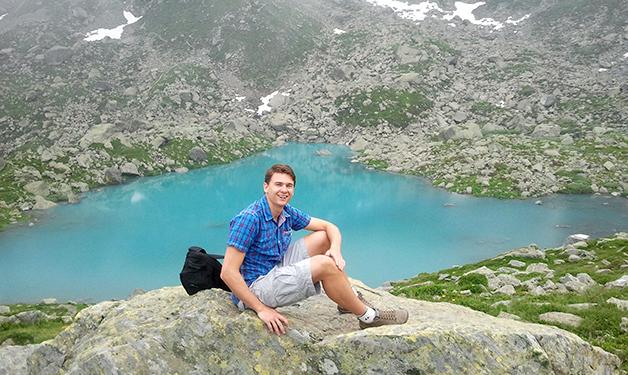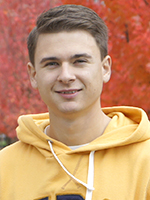
Meet Alessio—scrutinizing the push-pull effects of pain and movement.
Q: What is your area of interest in health research?
A: My primary research interest is pain and how it relates to motor control. We know that pain changes the way we move by changing how our muscles are activated. However, more research is needed to understand the effect of pain on movement and, conversely, the effect of movement on pain.
For my post-doc, I am studying pain and movement at the Sensorimotor Physiology Laboratory at UBC and MEA Forensic in Richmond—where they can simulate car accidents in their biomechanical laboratory. With this technology, I have started investigating whiplash and neck pain. My research will examine how the head and neck move in response to simulated whiplash from a car accident. I am also looking at how pain influences muscle activation and neuromuscular control of the neck.
At the Sensorimotor Physiology Laboratory, I am looking into vestibular control—the sensory system in the body that helps us with balance and awareness of spatial orientation—and how the body responds to stimulation. With primary investigator Jean-Sebastien Blouin, we are using robots and other specialized equipment to see how different stimuli affect the body in different ways, such as muscle activation. It is a very unique opportunity, and I am excited to be here.
Q: What drew you to this line of research?
A: Before moving to Canada for my PhD, I studied physiotherapy in Italy. I have always been interested in musculoskeletal pathologies and any kind of pain, from ankle to knee, back and neck pain. Although we have a lot of treatments and interventions to help people manage pain, I believe there is room for innovative improvements. This area really interests me from a scientific perspective because, like many other researchers in my field, I feel we need to know more about these pathologies and how to properly treat them.
Q: What does your average day look like?
A: The thing about being a researcher is that we do not have average days. I usually head to the lab early in the morning. Some weeks I will focus on data collection and meet with people who come into the lab to undergo tests for one of our studies. Other weeks, I might go to a conference and network with other scientists and researchers. I like the constant change and that no day is the same as another.
Q: What do you enjoy the most about your work?
A: I really enjoy coming up with new research ideas. The process of brainstorming collaboratively with my peers and supervisors is one of the things that I find the most interesting about my work. I also enjoy presenting my work to others and making my research accessible to different audiences, such as university students and the public. When I lived in Italy, I worked with an engineering lab for four years. We participated in several events, including presenting science demonstrations to members of the community and attending school science fairs where we would teach students about muscle activation through games. It was really rewarding.
Q: Who inspires you?
A: The scientific community as a whole inspires me because we talk with each other and share knowledge.
Q: If you could go on vacation anywhere in the world, where would you go?
A: I went to Thailand earlier this year and it was amazing. Next I would like to travel to Indonesia. I have seen pictures of the forests and beaches there and think it looks really nice.
Q: What do you do to unwind at the end of the day?
A: I love food, both eating and cooking. Since moving to Vancouver, my wife and I have really enjoyed trying different restaurants and hosting dinner parties with friends. I also play a lot of beach volleyball during the summer, which is amazing. Last year, a group of us graduate students bought a shared volleyball net. We took it down to Spanish Banks to play volleyball and have a barbecue. It was a lot of fun.



